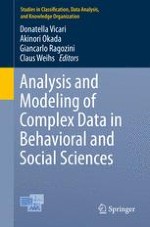2014 | OriginalPaper | Chapter
Clustering of Stratified Aggregated Data Using the Aggregate Association Index: Analysis of New Zealand Voter Turnout (1893–1919)
Authors : Eric J. Beh, Duy Tran, Irene L. Hudson, Linda Moore
Published in: Analysis and Modeling of Complex Data in Behavioral and Social Sciences
Publisher: Springer International Publishing
Activate our intelligent search to find suitable subject content or patents.
Select sections of text to find matching patents with Artificial Intelligence. powered by
Select sections of text to find additional relevant content using AI-assisted search. powered by
